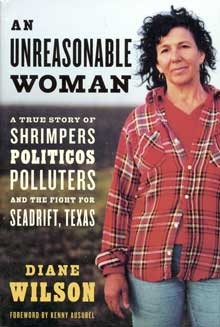When I first met Diane Wilson, she was sitting barefoot in the bed of her Chevy truck, which was parked by the side of a highway near Seadrift, with the Dow chemical plant looming behind her. Her hunger strike against Dow, then in its 29th day, had distilled her thinking, which was as clean and hot as blue flame.
A fifth-generation shrimper, Wilson brings equal clarity and eloquence to An Unreasonable Woman, her story of fighting Seadrift’s myriad chemical plants and, in particular, the Taiwanese company, Formosa, which had been all but thrown out of its home country for environmental transgressions.
A woman so shy she could barely speak at her first press conference, Wilson transforms into a virago who goes toe-to-toe with the Formosa chairman. Although her neighbors and family turn on her, her dog is shot, her boat sabotaged over the course of her crusades, gradually informants, including sick Formosa workers and disenfranchised state employees, slip Wilson documents with damning data.
While the book is a tale of one woman in one Texas county, it recounts a tragedy that often unfolds in towns across the United States. With promises of rejuvenating withered local economies, polluting industries seduce bankers, chambers of commerce, and politicos of ghost towns the state offered $250 million in incentives to entice Formosa to Seadrift and within a decade, residents are sick and dying beneath the smokestacks.
| Related stories: “Hungry for justice,” August 22-28, 2002; “People 1, Dow 0,” September 5-11, 2002. |
As Wilson’s story illustrates, state and federal agencies often infiltrated by former industry muckety-mucks collude with the very polluters they are charged with regulating. The Calhoun County Air Control Board, the Texas Water Commission, and Environmental Protection Agency become apologists for Formosa as it prepares to build a massive new plant: reducing fines for illegal discharges of cancer-causing chemicals, burying pollution data that shows willful contamination of the land and water, and denying Wilson’s requests for environmental-impact studies.
Several well-known politicians emerge as conspirators in the Formosa controversy, including former U.S. Senator Phil Gramm of San Antonio, who received campaign contributions from the company, then whiz-bang, whaddya know, appointed his former campaign adviser to the head of EPA Region 6, with final authority over Formosa penalties and permits.
Between environmental sagas, Wilson nimbly weaves vignettes that illustrate the conflict between her love for her town, the sea, and shrimping and an endemic patriarchal culture. The book’s tone is that of an oral history, rife with Texas sayings and Wilson’s gift for humanizing the bay as pollution invades it: “Did it smell the coming when before it knew only the relentless ebb and flow of a tide and the sound of gray heron feeding ... and the hundreds and hundreds of years it had been silent and slept beneath the benign stars?”
Earlier this month in Austin, Bill Moyers closed a speech before the Sociey of Environmental Journalists, saying: “Who is left to open the eyes of the country to tell Americans what is happening? There is no one left; none but all of us.”
Diane Wilson would agree. •
By Lisa Sorg
















